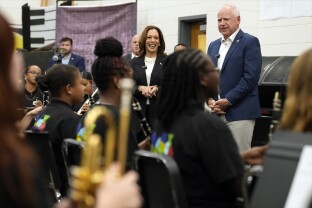SAVANNAH – Democrats say there are “secret” voters in rural, predominantly white parts of Georgia who would be willing to vote for Kamala Harris and Tim Walz, even if they’re not going to put a yard sign up for the campaign.
“There is a real fear that if I have a sign on my car, or a sticker on my car or sign in my yard, that it could be stolen, it could be shot and or damaged, vandalized,” Cathi Frederiksen, regional organizing director for the Democratic Party of Georgia, which is running a coordinated campaign with the Harris-Walz ticket, told NOTUS. “I’m not willing to take that risk, no matter how strong my politics and my political beliefs are.”
Contrary to past Democratic electoral wisdom, focused on driving up urban and suburban voter turnout in the metropolitan Atlanta area, there’s growing evidence that focusing on narrowing the margins in counties they won’t win can tip the scales.
